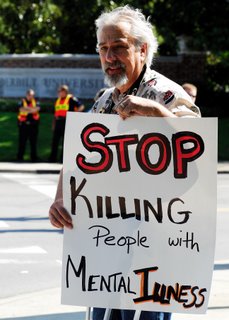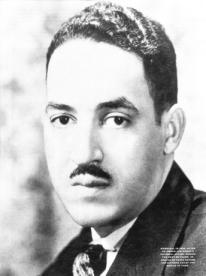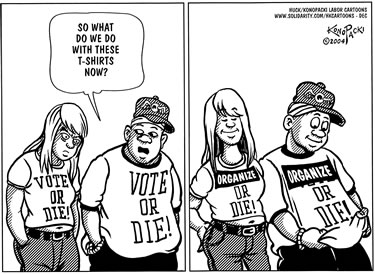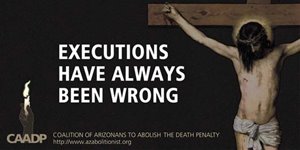Thursday, November 30, 2006
Transforming Tragedy
Betty Lewing is a teacher in Lufkin, Texas--a state with a very high incarceration and execution rate, not known for its progressive responses to violent crime. Seven years ago, Betty's daughter was kidnapped and raped. Obviously, Betty and her family were devastated. Betty needed a way to understand what had happened, and in her search for answers, began working in the prison. She was amazed to discover how many of the inmates were unable to read. Betty made a choice. She decided to respond to her personal tragedy, not by lashing out, but by teaching young people to read.
To date, Betty Lewing has taught 600 teenagers who were struggling to read the skills that they need to succeed. Perhaps even more importantly, Betty provides these youth, many from troubled homes, with a caring and consistent presence. Her students know that she is only a phone call away.
Betty Lufkin is an example of an ordinary person who made a choice--a choice to take a horrible tragedy and transform it into something healing, not only for herself but for untold numbers of people. Who knows how many lives have been changed, how many prison sentences have been avoided, because of Betty's choice.
Click here to learn more about Betty's story
Wednesday, November 29, 2006
It's So Easy
 Not only easy, it's exciting! What am I talking about, engaging in TCASK's All I Want for Christmas is to Abolish the Death Penalty campaign. I just sent emails to 10 lucky friends and relatives requesting that, instead of buying me a Christmas present (that I probably don't want anyway) this year, they make a tax-deductible donation to TCASK instead. If they all make a $25 contribution, we raise $250. If just ten of you (plus Stacy and I) do the same, we raise $3000! That would pay TCASK's rent for the whole year!
Not only easy, it's exciting! What am I talking about, engaging in TCASK's All I Want for Christmas is to Abolish the Death Penalty campaign. I just sent emails to 10 lucky friends and relatives requesting that, instead of buying me a Christmas present (that I probably don't want anyway) this year, they make a tax-deductible donation to TCASK instead. If they all make a $25 contribution, we raise $250. If just ten of you (plus Stacy and I) do the same, we raise $3000! That would pay TCASK's rent for the whole year!And it is simple. Just click here to TCASK's website, and fill out the very easy form. It will send email or postcard messages requesting the donation in lieu of your gift this year. So get it done before they go shopping! It's easy, and what better present than abolishing the death penalty could there really be?
A Mother's Plea
- The U.S. Supreme Court has said that Paul House is not guilty
- The lower courts have ignored the deadlines for their rulings
- Paul House suffers from a degenerative illness and is getting sicker
- Regardless of one's opinion about the death penalty, it is wrong to hold an innocent man on death row
- Please issue a full pardon for Paul House
For more information about Paul House's case, click here, or attend the December TCASK Chapter meeting in your area, where we will be watching the 60 Minutes story on Paul House and writing to the Governor.
Tuesday, November 28, 2006
Inside- Outside
So how do we do it? With an inside-outside strategy. That is to say that our legislators need to be hearing about the death penalty and how flawed a system it really is from outside the capitol in their districts and from inside the chambers of the legislature. Now, we at TCASK are primarily organizers. We go out and meet people where they live, pray, and work and mobilize and empower them to take action against the death penalty. That's why I've been all across the state, from Memphis to Johnson City, this year, talking to groups and meeting with individuals to develop working groups to fight against the death penalty. So that's the outside.
But the inside end of our work can be difficult too. And I just said that I'm an organizer. This generally mean
 s that I'm not up on the hill day in and day out. I don't have years of experience and personal relationships with legislators built up. So we need to find someone who does.
s that I'm not up on the hill day in and day out. I don't have years of experience and personal relationships with legislators built up. So we need to find someone who does.Fortunately, we are blessed with a wonderful group of legislative partners who have exactly the experience, relationships, and skills as lobbyists to provide the inside part of the strategy. Yesterday, we sat down with our legislative partners from the Catholic Public Policy Commission, the ACLU, NAMI, and TACDL, to talk strategy, hash out the specifics of the bill, and figure out questions about sponsorship. And these folks know what they are talking about. They know the legislature inside and out. They can talk to legislative leaders behind the scenes to guarantee that an effective and fair study commission is nominated. And they can go to prospective sponsors and get in the door to pitch the bill way more easily than I could.
So, in a few weeks, two of these terrific lobbyists will approach one of our prospective sponsors with our draft of the bill. And today, I'll be contacting our supporters in their district to get them to write their legislator and let him know that folks in the district want this to happen. And that's how we work an inside-outside strategy to git er dun!
Monday, November 27, 2006
Creature Comforts
And there are lots of opportunities for volunteers. We need someone (or lots of someones) to help us with updating our database for the legislative session, because as we go into it, we need to know how many supporters we have in each legislative district, and we need to be able to contact them. Database work isn't the most exciting thing in the world, but it's something that makes a huge impact on our work and even the shy and retiring can do it. We need people to work on developing materials around specific cases, and to help with long-term projects, like the Circle of Grace program. We need people to make phone calls on a regular basis. We even need people to help us move furniture on Sunday.

And last, but not least, we need some wonderful person to donate a small couch to the TCASK office. You see, we work very long hours a lot of the time, and when we're talking strategy, or reading case briefings, or making phone calls, it can be really nice to have something other than a straight-backed chair to sit in. Plus it makes the office so much more homey (our last office had a couch, and I even choreographed a little dance to celebrate it). The more comfortable we are in our office, the more efficiently we can all work to end the death penalty once and for all and shut this office down!
Wednesday, November 22, 2006
What's in a Name?
So on Monday, I'll meet with our legislative partners (there are a lot of folks interested in the death penalty, by the way, including The Catholic Public Policy Commission, the ACLU, the Tennessee Association of Criminal Defense Lawyers, the National Alliance on
 Mental Illness, the Tennessee Justice Project, and the NAACP) and we'll go over our bill, our work to pass it, and our potential legislative allies and opposition. What does that mean? It means that today I am re-working or bill after having asked some wonderful people at Equal Justice USA and New Jerseyans for Alternatives to the Death Penalty for some feedback. Then I'll present those changes to our legislative partners and we'll begin our work.
Mental Illness, the Tennessee Justice Project, and the NAACP) and we'll go over our bill, our work to pass it, and our potential legislative allies and opposition. What does that mean? It means that today I am re-working or bill after having asked some wonderful people at Equal Justice USA and New Jerseyans for Alternatives to the Death Penalty for some feedback. Then I'll present those changes to our legislative partners and we'll begin our work.Crafting a moratorium bill can be difficult as we want to find common ground with as many other groups as possible and ensure that the people who are not abolitionists (TACDL, NAMI, the Justice Project) can support the bill and get behind it. What do we call the bill? Because that's the name that legislators will hear. We want the title to include words that everyone can get behind, words like justice, fairness, and equality. Those are universal ideals that we can all agree on. The moratorium bill from last year did this somewhat, but I think that we can do it more effectively in this year's draft - the one that's going to pass. And we want to ensure that the study commission is a fair one, with all the key players and experts involved, and will look at all the necessary documents in order to generate a truly complete report on the system.
So buckle up, because the session is going to start and it's going to be time for TCASK activists to hit the phones, the internet, and the halls of the legislature to let our representatives know that it is time to stand up for justice!
Tuesday, November 21, 2006
Lord, "Grant" Us...
 ut what has been accomplished this year. Even more exciting are the strides we will make in Tennessee in 2007 as we begin our strongest push ever for a legislative moratorium in the next session. I have spent a good deal of my time this last month focusing on our financial footing and specifically have been working on a major grant for TCASK. The finishing touches have just been completed, and the grant went in the mail today! Oh Lord, grant us!
ut what has been accomplished this year. Even more exciting are the strides we will make in Tennessee in 2007 as we begin our strongest push ever for a legislative moratorium in the next session. I have spent a good deal of my time this last month focusing on our financial footing and specifically have been working on a major grant for TCASK. The finishing touches have just been completed, and the grant went in the mail today! Oh Lord, grant us!As I am already entertaining thoughts of turkey and dressing today, I also reflect upon the many people for which I am thankful:
- for Alex Wiesendanger, my colleague, whose energy and vision amaze me
- for Amy Staples, the Chair of the TCASK board, whose leadership is inspiring
- for James Staub, Vice Chair of the board, who is infinitely patient and helpful with my technological challenges
- for chapters in Memphis, Nashville, Chattanooga, Knoxville, Rutherford County, and at MTSU who are dedicated to ending the death penalty
- for each and every volunteer and donor to TCASK who enable us to do the work that needs to be done
- for people like Joyce House, Hector and Susie Black, Clemmie Greelee, Regina Hockett, Charlie Strobel and others who are willing to share their painful stories in order to change minds and hearts concerning the death penalty
Of course, there are so many other people to thank, but I don't have the room! What I am most thankful for this year is that I have been given the opportunity to dedicate my full time work and ministry to the abolition of the death penalty in my home state. I am grateful for the many people with whom I share this work and look forward to what we will do together in the months ahead. Hopefully, the Lord will grant us in whatever ways we need granting!!!
Monday, November 20, 2006
Harry Simpson Rocks My World!
And this afternoon, less than six hours after my email, I got the following email from my friend Harry:
Submitted letters to editor to Tennessean and the City Paper this afternoon.
Harry

Now how is that for membership that rocks!? Harry's been a key member of the Nashville TCASK Chapter for about a year now. He's been the unofficial TCASK photographer, worked for justice at Justice Day on the Hill, and turned out for protests against the execution of Daryl Holton. So I just wanted to give Harry a shout out so everyone (or the 30 people who read this blog) can know how much we appreciate him.
Now, for all you other people, get out there and be like Harry! He can git er dun!
Thursday, November 16, 2006
Neither Rain, Nor Sleet, Nor Snow. . . or When it Rains, Make Rainolade
The weather was really ugly yesterday, raining, and storming, and Joyce called me in the afternoon to ask if the talk was still on. But, this son of a mailman is not going to cancel speaking engagements due to incle
 ment weather. Sadly, everyone doesn't feel the same. We had initially been scheduled to speak to a group of adults from the church, but with such terrible weather, only a few showed up. Never mind! We co-opted two teenage religious education classes to beef up the audience and the newly enlarged group was privileged to hear the amazing stories that Hector and Joyce have to tell. And those stories, stories of forgiveness and hope, move people.
ment weather. Sadly, everyone doesn't feel the same. We had initially been scheduled to speak to a group of adults from the church, but with such terrible weather, only a few showed up. Never mind! We co-opted two teenage religious education classes to beef up the audience and the newly enlarged group was privileged to hear the amazing stories that Hector and Joyce have to tell. And those stories, stories of forgiveness and hope, move people.So we had a small audience, but we had a mobilized audience. And that can mean a lot. In this case, it means that people want to have us back to speak with the entire parish. And it means that a member of the parish council is interested in bringing a moratorium resolution to the council and putting St. John Neumann on record as supporting a time out on executions.
As the saying goes, never doubt that a small group of committed people can change the world; in fact it's the only thing that ever has. It may be rainy and stormy, but we will continue to speak to groups small and large and find the most effective ways to move those people to take effective steps toward abolition.
Tuesday, November 14, 2006
Law and Action
Wednesday morning.
That same day, in the afternoon, Stacy and I will be meeting with a number of lawyers in the Federal Public Defenders office around a number of cases. I can't stress enough how important these partnerships
 are to our work. Especially in Tennessee, the incredible lawyers working in the appellate process are the dike holding back the flood of over 100 executions that could happen. Secondly, the lawyers are the absolutely experts on the cases. They can offer the most information and access to facts that allow us to frame any particular execution as a part of the larger debate on the utility of the death penalty as a public policy.
are to our work. Especially in Tennessee, the incredible lawyers working in the appellate process are the dike holding back the flood of over 100 executions that could happen. Secondly, the lawyers are the absolutely experts on the cases. They can offer the most information and access to facts that allow us to frame any particular execution as a part of the larger debate on the utility of the death penalty as a public policy.TCASK's working model for prepping for a case looks like this. When we see that a case will be coming up (an execution date is likely to be set) we sit down with the lawyers working the case (when we can get all the parties together) and talk through the facts of the case. We talk about the public framing that will work best for us, and see how that plays in to the legal strategy that the lawyers are working on. Then we at TCASK put together our case summary (you can see some of those case summaries here) which we then send to the lawyers to make sure that it isn't factually inaccurate and doesn't get in the way of the legal strategy. In other words, we find the best public frame within the confines of the legal strategy put forward by the attorneys (the last thing we want is to screw up a legal strategy designed to protect a person from execution).
This model hasn't been in place very long, but so far it has worked well. We'll be putting it into place tomorrow on the case of E.J. Harbison and Paul House. But mostly we hope to eventually never have to have these meetings again, after we end the use of the death penalty.
Monday, November 13, 2006
Dear Peggy
A lot of you may not know Peggy, but she is on the TCASK mailing list and, when she saw the request for a volunteer newsletter layout editor, Peggy responded. See, she's in the process of completing a graphic design degree (translation: she knows waaaaaay more about design and layouts than Stacy and I ever will) and realized that this might be the way that her talents could be of help to TCASK.
Peggy was in the office today to show Stacy and I some initial design thoughts (they are cooler than ours) and to discuss the timing of the next newsletter, and we are really excited to have someone both willing and able to do this job, which is both so critical and so difficult
 for us to do. So a big TCASK Blog thank you to Peggy.
for us to do. So a big TCASK Blog thank you to Peggy.And where do all of our readers fall into this picture? Well, only you can answer that, but there are tons of things that people can do to help. Do you live in the Nashville area? Then spend some time volunteering in the TCASK office helping with our database transition (not sexy work, but oh-so important). Good at smiling? Join the TCASK legislative working group to get our newly minted legislators educated about Tennessee's broken capital punishment system. Good at writing? Send letters to the editor regarding Tennessee cases. Have money? Donate some to TCASK! And there are a lot more opportunities available. In short, my fellow Tennesseans, ask not what your abolition group can do for you, but what you can do for abolition.
Friday, November 10, 2006
Where Have All the Soldiers Gone?
But on Veterans Day, while honoring all of those who have fought for our country, I find my mind turning to several veterans that are still waiting to be properly served. The incidence of mental illness and dependency issues is very high among veterans. Sadly, all vets do not receive the medical care, physical or mental, that they deserve when they come out of the service. Sadly, we know what can happen when people with severe mental illness do not receive the mental health care that is needed. And some veterans, left without such treatment, have ended up on Tennessee's death row.
Greg Thompson served in the Navy, but, during his tour, people began to notice irregularities in his behavi
 or. He would over react to minor stimuli, cry uncontrollably, and seem to experience a different reality than those around him. Sadly, rather than treat him, the Navy dishonorably discharged him. Thompson has since been diagnosed with schizophrenia, schizo-affective disorder, and bipolar disorder. In 1985, suffering from delusions caused by his mental illness, Thompson, while not truly understanding his actions, committed a tragic murder and was sentenced to death. Thompson was nearly executed in February.
or. He would over react to minor stimuli, cry uncontrollably, and seem to experience a different reality than those around him. Sadly, rather than treat him, the Navy dishonorably discharged him. Thompson has since been diagnosed with schizophrenia, schizo-affective disorder, and bipolar disorder. In 1985, suffering from delusions caused by his mental illness, Thompson, while not truly understanding his actions, committed a tragic murder and was sentenced to death. Thompson was nearly executed in February.
Abu-Ali Abdur Rahman, after years of incredible brutal physical and sexual abuse at the hands of his father, joined the Navy. In the Navy, Abu-Ali, then called James Jones, was likewise repeatedly abused and raped. Eventually, Abu-Ali was diagnosed with disassociative disorder and PTSD. Abu-Ali was discharged and never received the treatment that he needed. He now sits on death row, although there are serious questions regarding the reliability of his conviction.
Daryl Holton was nearly executed two months ago. Holton had served in the first Gulf War and had, ev
 en during his tour of duty, been diagnosed with major depression, with suicidal impulses and symptoms of psychosis. But, once again, Holton never received the full course of treatment that he needed. After his discharge, Holton's mental illness worsened. He talked of committing suicide and eventually, in an attempt to "save" his children, whom he loved more than anything, from a horrible existence, he killed them and planned to kill himself.
en during his tour of duty, been diagnosed with major depression, with suicidal impulses and symptoms of psychosis. But, once again, Holton never received the full course of treatment that he needed. After his discharge, Holton's mental illness worsened. He talked of committing suicide and eventually, in an attempt to "save" his children, whom he loved more than anything, from a horrible existence, he killed them and planned to kill himself.All the deaths in the cases of Greg Thompson, Abu-Ali, and Daryl Holton were tragic. But the tragedy is compounded by the fact that these deaths could have been prevented if we had provided our veterans with the health care services that they need. On this Veterans Day, let us, as a people, resolve to truly honor our veterans, by providing the care they deserve, rather than executions.
Thursday, November 09, 2006
Anyone Remember Paul House?
Well it should, because the U.S. Supreme Court ruled in House's case that, " This is the rare case where had
 the jury heard all the conflicting testimony it is more likely than not that no reasonable juror viewing the record as a whole would have lacked a reasonable doubt. In other words, with a fair trial, Paul House would have been found not guilty.
the jury heard all the conflicting testimony it is more likely than not that no reasonable juror viewing the record as a whole would have lacked a reasonable doubt. In other words, with a fair trial, Paul House would have been found not guilty.So, with the words of the highest court in the land ringing in their ears, what have Tennessee and the lower courts done? A whole lot of nothing. Well that's not fair, there has certainly been some foot dragging, and the state does still proclaim House's guilt, so there's that.
Let's take a trip down memory lane, just to make clear on what incredibly solid evidence the state is basing its claims of House's guilt. In 1985, House was convicted of the murder of Carolyn Muncey, a woman who lived near him. The state presented rape as the motivation for the murder as well as the aggravating factor that called for a sentence of death. There were no eyewitnesses, but there were two crucial pieces of forensic evidence: 1) semen on the victim's body that matched Paul House's blood type, and 2) blood on Paul House's pants that matched Carolyn Muncey's. With evidence like that (and no cracker-jack legal defense team) it didn't take the jury long to convict House and sentence him to death.
But, as House's case winds its way through the legal system, we develop the capability to do DNA testing, and, when this new technology is finally applied, it is discovered that the semen does not belong to Paul House! In fact, it belongs to the victim's husband - her estranged, alcoholic, abusive husband. Her husband who, according to six witnesses, has confessed, while drunk, that he got in a fight with his wife and accidentally killed her! In fact two of these witnesses came to police before House's initial trial and were told that no one was interested in their information!
And the blood? Well, it turns out that the blood on House's pants is Carolyn Muncey's, but it also turns out that the medical examiner took four vials of blood from Muncey's body after death. Four vials that were shipped in the same crate as House's pants. And now only two-and-a-half vials of that blood can accountedted for by anyone! And two forensics experts have testified that the blood on the pants came from those vials, not from Muncey's body while she was alive.
So where does that leave the "proof"? Semen and reported confessions that point to another man, blood evidence that points to tampering, and no eyewitnesses, motive, or confession linking Paul House to the crime.
Paul House suffers from MS. He is confined to a wheelchair and his speech is becoming impaired. He receives next to no medical treatment on death row (a multi-vitamin and a tylenol PM daily). It is high time that justice be done and House be set free. So get set, because, with the Governor fresh off his landslide victory, it is past time for him to step up to the plate and do the right thing where House is concerned! Even if you believe in the death penalty, keeping an innocent man on death row for 20 years is unacceptable! And the people of Tennessee aren't going to accept it any longer!
Tuesday, November 07, 2006
What's Next?

If you are reading this and haven't voted yet, get up and go vote. I know it's hard to tear yourself away from our charming blog, but take the plunge. It will still be here when you get back.
Back yet? Good.
Congratulations on voting, but that, really, is just the beginning. Starting tomorrow, our real work begins. What real work? Educating the legislators we've just elected about the truly deadly flaws in Tennessee's capital punishment system. Why do we have innocent people on Tennessee's death row (does anyone remember Paul House?)? "Senator, do you support executing people in a racist manner?"
Our representatives our elected/ hired to represent our interests when they get to capital hill, so, before they get there, we need to tell them what those interests are. They need to know two crucial facts 1) Tennessee's capital punishment system is broken and 2) Tennesseans are not going to sit by and let such a system (not) work in their names!
With the death penalty, we are in a politically tricky situation. There aren't many districts, in Tennessee or anywhere, in which being against the death penalty plays particularly well. So even if we could endorse candidates (and as a 501(c)3 we can't) we probably wouldn't because it wouldn't be that helpful. And even concerns about the reliability of the system don't always make the best 30 second spot. So we need to help educate officials after they are elected.
Ready to get started?
Monday, November 06, 2006
Let's Think Back
However, Iraq's decision to execute Hussein calls to mind, for me, another decision in a similar situation. When Apartheid was ended in South Africa, there were certainly many calls f
 or punishment of the people who had perpetrated such oppression. But South Africa took a different tactic. Rather than resort to vengeance and violence (even against those who had practiced the same) the new government chose to set up truth and reconciliation commissions, which offered the opportunity for true healing and understanding for victims. And the country went farther, banning the use of the death penalty in its constitution. Having faced oppression, the people of South Africa knew that no government should take away the lives of its citizens.
or punishment of the people who had perpetrated such oppression. But South Africa took a different tactic. Rather than resort to vengeance and violence (even against those who had practiced the same) the new government chose to set up truth and reconciliation commissions, which offered the opportunity for true healing and understanding for victims. And the country went farther, banning the use of the death penalty in its constitution. Having faced oppression, the people of South Africa knew that no government should take away the lives of its citizens.As the world watches the battle of the life of Saddam Hussein unfold, it may be useful to remember some of these lessons. Do we want to reject oppression and violence, like South Africa, and join the ranks of Western democracies in turning away from capital punishment, or fall into step with China, Saudi Arabia, Vietnam, and Iran in choosing executions?
Thursday, November 02, 2006
Another New Low
“Apparently,” a federal judge wrote in 2001, “neither attorney Radolovich nor the prosecution knew of petitioner’s actual identity until his case had been affirme
 d on appeal.”
d on appeal.”It's pretty shocking! But what's even crazier is that the 5th circuit ruled that this representation did not merit an overturning of the inmate's death sentence or a new trial!
In Tennessee, we aren't doing much better. Half of all death sentences in Tennessee are overturned on appeal, and more then two-thirds of those then receive a sentence less than death on rehearing. Our system simply does not produce reliable outcomes. The fact that we let such a system go forward should be shocking to anyone concerned with justice.
Read the whole article here.
Wednesday, November 01, 2006
Faithful? Politicians? Pro-Life? . . . I'm confused
One of the new Democratic attempts to mobilize religious voters in a new website called Faithful Democrats. This website and group, co-founded by Tennessee State Senator Roy Herron, puts forward Christian arguments on Democratic and progressive issues. I'm not coming down on one side or another of this debate - that would require a much longer entry and I don't think that anyone would actually read it - but here's where I will speak out: Where are these faithful Democrats on the death penalty? In an article questioning the pro-life ethic (does pro-life only mean abortion) the writer failed to mention the death penalty anywhere.
Now for me, and I'm sure many others who are motivated to fight the death penalty from a faith perspective, this is unconscionable. People of faith from across the country and the religious spectrum have called for an end to capital punishment, not only because it violates our belief in the sanctity of human life and puts human beings and human government sin the position of usurping God's position as the one and only judge, but also because of the unfair targeting of the least of God's children - the poor, the mentally ill, those discriminated against because of their race. And most (not all but most) of the Christian denominations in the country have come out against the death penalty including the United Methodist Church, the Presbyterian Church, the Catholic Church, the Lutheran Church, the Episcopal Church, the United Church of Christ, and the Disciples of Christ to name a few (for a more complete list of denomiation and their statements of opposition click here). And yet, faithful democrats, whose arguments are based both on Christian faith traditions (Roy Herron was previously a United Methodist minister) and care and concern for the poor and oppressed, make no serious mention of the death penalty anywhere on this site.
Now I don't want to seem naive. I kknow that this is an election year, and politicians (Democrat and Republican) who talk about their faith do so, in large part, to win votes. And maybe opposing the death penalty, despite what we know about its risks of executing innocents, its targeting of the poor, the mentally ill, and racial minorities, its extravagant costs, and its failure to protect us from crime, is not a winning political issue. But to challenge pro-life arguments and not even mention the death penalty is to run scared and be disingenuous.
So here's what we do. Let's not let this slip by. Go to www.faithfuldemocrats.com and let's make some comments. Let's talk about the death penalty (abolition has often, sadly, been a Democratic issue) and let's spark some internet debate. Let's get the word out that lots of faithful people, Democrat and Republican alike, are called by their faiths to oppose the death penalty. And we think that our elected officials who feel the same should have the courage to say so.



